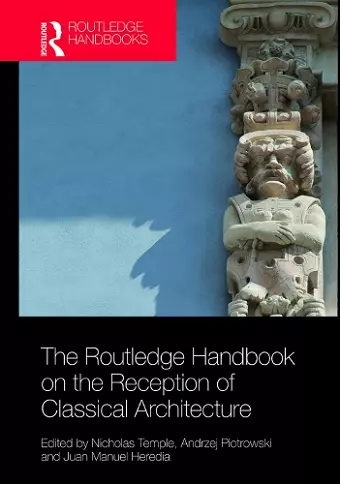The Routledge Handbook on the Reception of Classical Architecture
Nicholas Temple editor Andrzej Piotrowski editor Juan Manuel Heredia editor
Format:Hardback
Publisher:Taylor & Francis Ltd
Published:20th Nov '19
Currently unavailable, and unfortunately no date known when it will be back
This hardback is available in another edition too:
- Paperback£45.99(9781032085418)

This is the first comprehensive study of the reception of classical architecture in different regions of the world. Exploring the impact of colonialism, trade, slavery, religious missions, political ideology and intellectual/artistic exchange, the authors demonstrate how classical principles and ideas were disseminated and received across the globe. By addressing a number of contentious or unresolved issues highlighted in some historical surveys of architecture, the chapters presented in this volume question long-held assumptions about the notion of a universally accepted ‘classical tradition’ and its broadly Euro-centric perspective.
Featuring thirty-two chapters written by international scholars from China, Europe, Turkey, North America, Mexico, Australia and New Zealand, the book is divided into four sections: 1) Transmission and re-conceptualisation of classical architecture; 2) Classical influence through colonialism, political ideology and religious conversion; 3) Historiographical surveys of geographical regions; and 4) Visual and textual discourses. This fourfold arrangement of chapters provides a coherent structure to accommodate different perspectives of classical reception across the world, and their geographical, ethnographic, ideological, symbolic, social and cultural contexts. Essays cover a wide geography and include studies in Italy, France, England, Scotland, the Nordic countries, Greece, Austria, Portugal, Romania, Germany, Poland, India, Singapore, China, the USA, Mexico, Brazil, New Zealand and Australia. Other essays in the volume focus on thematic issues or topics pertaining to classical architecture, such as ornament, spolia, humanism, nature, moderation, decorum, heresy and taste.
An essential reference guide, The Routledge Handbook on the Reception of Classical Architecture makes a major contribution to the study of architectural history in a new global context.
"While accomplishing its ambitions to examine the reception of classical architecture around the world, this remarkably edited collection is no mere compilation of scholarship under set ideological assumptions. Beyond impeccable and original historiography, its great merit is a critical openness to the complexity of cultural, social and political issues raised by the topic. Given the European origins of global technological civilization, the particular adoption of the classical tradition in diverse postclassical and modern historical contexts is a timely topic to orient our conversations about appropriate architectural practices." - Alberto Perez-Gomez, Bronfman Professor of the History and Theory of Architecture, McGill University, Montreal, and author of Attunement, Architectural Meaning after the Crisis of Modern Science
"This book clarifies the decisive differences between the style we call classicism and the ideas and practices that define the classical tradition, as received and revised in Europe and beyond. Readers will discover how the tradition’s creative nucleus re-established itself throughout the world, thus authorizing comparably creative revisions for any one at work in architecture today." - David Leatherbarrow, Professor of Architecture, University of Pennsylvania
"Was it the same 'classic' architecture the Romans took to Libya, the Jesuit missionaries to the Kangxi Emperor and Sir Edwin Lutyens and Sir Herbert Baker got the Indians to build in Delhi? Or is it all more brutal, as Goethe thought:: 'classical is healthy, romantic is sick'. If you have wondered about such matters Temple's, Piotrowski's and Heredia's book offers a unique panorama of such problems." - Joseph Rykwert CBE, Professor Emeritus of Architecture, University of Pennsylvania
ISBN: 9781138047112
Dimensions: unknown
Weight: 1308g
584 pages